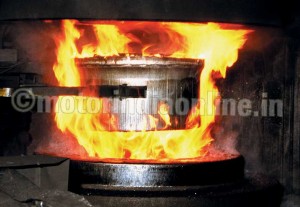The Indian forging industry has always been a major growth driver of the manufacturing sector and contributes for the success of automobile, power and general engineering sectors in the country. The Association of Indian Forging Industry (AIFI) is the apex organization with more than 250 members across India. Its members’ products include rough forgings and/or machined parts like crankshafts, connecting rods, camshafts, shifted fork, steering components, crown propeller shafts, gear box components; crown wheel and pinions, front axle beams, rear axle shafts, earthmoving links, railway tyres, flanges/pipe fittings and industrial valves.
The forging industry, which is a major supplier to auto companies and a critical industry that generates employment, has been continuously plagued with incessantly rising industrial fuel and steel prices resulting in rising input costs and shrinking margins.
AIFI has played a major role in encouraging proactive dialogues between all the relevant stakeholders like the industry and the Government, both in terms of suggestions for policy making and problem-solving, as also between the industry and the user industries, both domestic and global.
To gain better perspective and understanding of the overall forging industry scenario, AIFI commissioned an industry survey among 500-odd forging units. The survey objective was to evaluate the current and overall performance of the Indian forging industry covering small, medium and large segments and to address the critical areas which need immediate intervention. The results of this survey have been broadly summarized.
The findings of the survey were based on the responses given by the 419 units that participated in it. During 2012-13, the installed capacity of forging entities that participated in the survey was estimated at around 37.7 lakh tonnes. The total production of the said entities during the year was about 2.1 million tonnes.
The estimated turnover of the 419 entities in 2012-13 was Rs. 19,500 crores, with an overall capacity utilization of at around 57 per cent. The capacity utilization of these entities decreased from 65 pet cent in 2011-12 to 57 per cent in 2012-13 due to the decline in demand from the automotive industry which accounts for 61 per cent of total production of 21.12 lakh tonnes.
Based on the installed production capacity and annual sales turnover of these forging units, they were classified into five categories – very large, large, medium, small and very small units. The classification of units is based on the scale of operation, and the turnover is strictly based on AIFI’s internal classification standards.
The major forging clusters in India are Maharashtra, Punjab, Gujarat, Tamil Nadu, Haryana, Delhi, Karnataka, Jharkhand, West Bengal and Andhra Pradesh.
Distribution of region-wise installed capacity break-up:
• Western region – 40 per cent (1.53 million tonnes) – 159 units
• Northern region – 36 per cent (1.36 million tonnes) – 157 units
• Southern region – 16 per cent (0.59 million tonnes) – 81 units
• Eastern region around 8 per cent (0.29 million tonnes) – 22 units
These entities themselves provide direct and indirect employment to around 93,400 persons in the country. The primary raw materials used are carbon steel, alloy steel, stainless steel, super alloy, special steel, titanium and aluminium.
The small and very small units are mainly dependent on manual labour. However, medium and large units are semi/largely mechanized and some of the large units are world class.
The forging industry is often referred to as the backbone of the automobile industry. While the automotive industry is the main customer for forgings, its continuous efforts at upgrading technologies and diversifying the product range have enabled it to expand its base of customers even in foreign markets.
| Scale of | Installed capacity | Forging units | Forging units operation |
| range (in ‘000 MT) | (in nos.) | (in percentage) | |
| Very large | above 75 | 8 | 2% |
| Large | 30 to 75 | 15 | 3% |
| Medium | 12.5 to 30 | 32 | 8% |
| Small | 5 to 12.5 | 99 | 24% |
| Very small | upto 5 | 265 | 63% |
